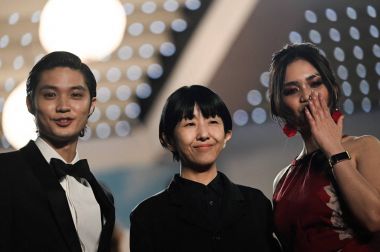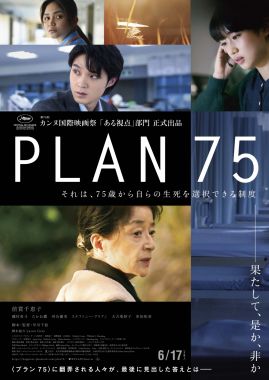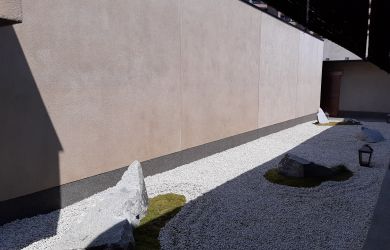
July 7, 2022
Based in Japan: Stefanie Arianne on Acting in Japan
Pushing through barriers, doubt and discrimination to become a star
By Mike Smith
What do you want to be when you grow up? It’s a simple question that most people on Earth have probably heard. Firefighter? Athlete? Pilot? Whatever your answer, you were probably then lectured on how to achieve that goal and what educational path to take, and told that all you have to do is work hard. What do you tell someone who wants to be an actor? It’s a career that requires zero prerequisites and is open to all ages and genders, but somehow only a tiny fraction — around two percent — make it big. This dilemma was the reality for Stefanie Arianne.
Originally from the Philippines, Arianne moved to Japan in 2012 with hopes of becoming an actor. Despite the tendency for Filipino actors in international cinema to be typecast and sidelined as blue-collar workers, Arianne has now hit her stride, landing a starring role in Chie Hayakawa’s award-winning film, “PLAN 75.”
The film won a Camera d’Or Special Distinction from the Cannes Film Festival 2022. A tangle of morals and social responsibility in a Japan of the near future, the government program Plan 75 encourages senior citizens to become voluntarily euthanized to remedy its aging population.
Fresh from the film sets and the red carpet of Cannes, Arianne sat down with Metropolis to discuss representation, type-casting and acting in a country where successful foreign actors are an exceptional rarity.
Metropolis: You’ve made it so far, but what initially got you into acting?
Arianne: I once asked my grandma when was the first time she saw me show interest in acting, and she just said it came naturally to me. I don’t know what sparked that when I was a kid, but my earliest memory is of wanting to be an actress.
I heard that the story behind your name and nickname is pretty coincidental to your life path. Do you mind sharing the story?
My nickname is Star. When I was still in my mom’s belly, my brother was already calling me bright names like Twinkle, Sparkle and Star. My family thought the name Star was too short, so they went with Stephanie Arianne because the first two letters of each spell star. Then my friends started calling me Star in school, since I always got the lead villain roles in theater.
At what point did you seriously start to pursue acting as a career?
When I moved to Japan, I told myself I would follow my dreams, and I just started registering with a bunch of freelance agencies. From that point, I went to so many auditions and got a lot of rejections. Over the years, my passion was slowly dying down, but it wasn’t until the most recent role [Maria in “PLAN 75”] that I realized why I wanted to do this from the start. This film lit that fire inside of me, especially working with a great director and team.
Chie Hayakawa is amazing. She knows exactly what she wants. From the script to watching her direct everyone and give clear instructions, it made me dig in deep and realize this is what I want to do. I want to help share people’s stories; I want to feel an experience, and I want to inspire people. This is what attracted me to acting in the first place.

What led to you getting this role?
When the pandemic hit, auditions and acting roles just stopped, and I was sort of at a point where I was thinking, why am I doing this? I can just focus my complete energy on a more typical job and forget about acting. Then I got the casting call email from my agent saying they were looking for local Filipino talent.
The initial actress they wanted to use was in the Philippines, but they needed someone who was already in Japan due to the pandemic. Luckily, I was selected. At this point I was praying, please don’t open the borders, please! Open the borders once the movie is out and my name is in the credits [laughs]. I do feel bad for her, but at the same time, I knew this would be my one big break.
Do you feel that getting into like the Japanese film industry is more about your talent, looks or who you know?
Definitely not skills. When they look for foreigners for TV shows or dramas, they don’t really mind if you’re a good actor or actress. They just want a foreigner. Whenever I’ve been to auditions for a TV role, they don’t make us act. They just ask us questions, look at us and say, “Okay, thank you.” They just want a specific look.
That’s why I appreciate auditions that make you act. I don’t fit the typical Japanese standard of how a foreigner looks. I’m not tall and blonde; I don’t have blue eyes. So it’s much harder to break into roles.
As far as using connections, I have received opportunities through a casting director friend, but he knew that I could act. No matter how many contacts you have, it’s still the client’s final choice if you fit the role or not.

Thinking back to when you acted in school plays, could you have ever imagined walking the red carpet at the biggest film festival in the world?
I never imagined this. I never imagined this was where my life journey would bring me. I’ve almost given up so many times. I’ve had so many people tell me to give up, even important people in my life. When someone important to you tells you to give up on your dream, it plants a seed. It took a lot of strength to tell them I had to choose what I want.
My family was not joking when they called me stubborn. It’s a trait you need in order to push through. Especially with how I look. I know this sounds bad — I wouldn’t say I’m ugly, but as a POC, you get stereotyped a lot, so it’s rare to do international films, especially in Japan, where they primarily focus on Japanese actresses.
When they look for foreigners for TV shows or dramas, they don’t really mind if you’re a good actor or actress. They just want a foreigner.
So, no, I wouldn’t have imagined this when I was younger. I didn’t even dream of being an actress in Japan, maybe just something I would be able to achieve in the Philippines.
Now that you accomplished this, what are your following goals?
To make it in Hollywood. I would love to do historical movies that showcase Filipino history to the world. And, of course, do something in the Marvel, Harry Potter or Doctor Who universe.
“PLAN 75” seems to have a realistic take on the reality for many Filipino women, especially in Japan’s health care industry. How did it feel to portray a character that reflects positively on Filipinos instead of the typical stereotyped roles?
It was nice to show that side of Filipinos, especially mothers. They’re powerful. It’s so empowering to be able to play my character Maria because it shows the struggles that Filipinos face. She really wants to be with… Okay, I’m doing a Tom Holland. Let’s just say that she’s a very strong character, and I feel so honored to play this role. It made me revisit my roots, which in a way was somewhat therapeutic.

Looking at your latest role from a different perspective, how does it feel that Filipinos and other Southeast Asians still get presented as financially struggling characters or characters overshadowed by the Western actor?
Things have gotten better recently, but we still have a long way to go. I remember seeing something online that said you know a hospital TV drama will be inaccurate when you don’t see any Filipino nurses, because in reality, if you go to the emergency room in the U.S., there’s a good chance one of the workers will be Filipino.
When someone important to you tells you to give up on your dream, it plants a seed. It took a lot of strength to tell them I had to choose what I want.
It’s the same thing when it comes to language. Usually, when there is a Filipino character they rarely speak English, even though everyone grows up speaking English. Luckily in “Plan 75,” the director had so much respect for my culture and often asked if things were accurate. So I think things are moving in the right direction.

What do you think about things finally going in the right direction for Asian representation in Hollywood?
I think it’s definitely amazing and still has room to grow. When people say Asians, they think of Japan, China and Korea most of the time. It’s always been like that. They forget the South and Southeast Asians. ‘The colored Asians.’ So it’s nice that we’re slowly getting some recognition, but there should be more.
There are a few Filipinio-Americans like David Bautista and Jacob Batalon, who got the chance to break through to make it big. But it would be great to see Filipinos who don’t physically live in America get their shot as well.
As more people try to find success in these creative career paths, the risk of people with bad intentions looking to take advantage of them also increases. Do you have any suggestions on finding the right people to work with in Japan?
That’s a hard one. Some of them look very professional and even get good reviews, but in my own experience, it doesn’t mean they won’t sexually harass you. When you’re starting, stick with the freelance agencies first. When collaborating with photographers and videographers, make sure that person has worked with one of your friends, so you know they are legit. You have to be careful, but don’t let fear stop you from practicing your craft.
Do you have any tips or suggestions for other foreigners looking to become an actor in Japan?
Have patience. You will go through many rejections, and you need to have a lot of self-love. There will be times that you will be constantly rejected, and it will make you question your worth. But even with that, try to find the core of why you’re doing this. Always ask yourself, why did you start doing this?
Start to network. It’s free! You never know who you’re going to meet, but be careful with how you act. I’ve met so many actors and models who had terrible attitudes. Remember, first impressions last. Japan may seem like it’s a big country, but it’s such a small community when it comes to foreigners. If one person experiences something bad with you and word gets out, you’re not going to get called anymore. You’re done unless you clean up your image, which is hard.
This job is tough to maintain as your primary financial source, so you’re probably going to need to have another job. Learn from my mistake and try not to lose what your goal is. I remember an ex telling me “Remember, this job you have right now is not your dream. This is just what you use to finance your dream.” Try not to lose focus if this is something you want. You have to be your own cheerleader.
Finally, surround yourself with really good people. People who will be excited for you and push you to do more and not someone trying to bring you down. It’s essential to have that support group to keep you humble and call you out on your bullshit.

If you’re interested in knowing more about Arianne, be sure to follow her Instagram @stefanie.arianne







